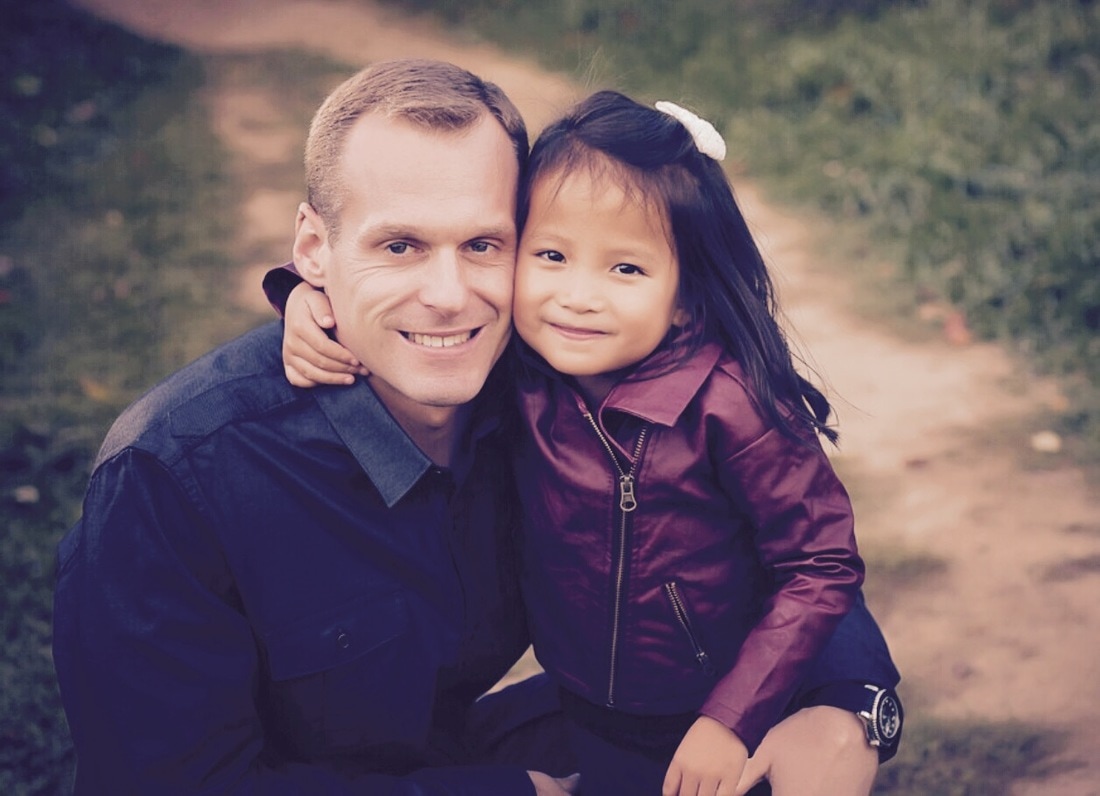Dave Lukas - Lessons for Hannah375: Lessons For Hannah - Focus Over Fear
Hello Misfit Nation! Welcome to another edition of "Lessons for Hannah!" Many years ago, I introduced a new format that alongside our regular episodes called “Lessons for Hannah.” Hannah is my daughter and one of the main inspirations for the Misfit Entrepreneur. I wanted to have a place where she could go and learn from her daddy and his Misfit friends throughout her life….even after I am gone. If you haven’t listened to the first episode of "Lessons for Hannah," I urge you to as it gives some more background and tells the amazing story of how Hannah came to be in our lives. Lessons for Hannah are short, very useful, and sometimes comical lessons, that I want to share with you and give to Hannah to help in your lives. Because I want Hannah to have these for her life, I’m going to speak as though I am talking directly to her. These episodes are a lot of fun and if you think there is a lesson that we should include in these episodes, please don’t hesitate to send it over to us at [email protected]. We’d love to share it. This week’s Lesson for Hannah Hannah, Recently, we did one of Mastermind meetings and one of the talks I did for the group was called “Focus Over Fear.” After giving the talk and having so many comment on how it made such a difference for them, I realized that I have never done a Lessons for Hannah on the topic of fear. Fear is something we all face at different times in our lives and for some, maybe even every day. Fear is a major emotional driver that can cause us to act in ways that are not necessarily in our best interest, but fear can also be a source of strength and opportunity when we use it in the right ways. Let’s start by talking about where fear comes from. As the most animal brain level, we all come with pre-programmed “fight or flight” mechanisms for survival. The core of the mind will do everything possible to avoid what it perceives as pain. The mechanisms when manifested take over and cause reactions that if we took time to think deeply about, we probably wouldn’t do. But these reactions happen in the moment and consume us so that our logical side goes almost dormant to the fear. On top of the animal side of our brain, society teaches that risk is bad and to stay from it, so most people are not prepared to deal with risk, when in fact risk is inherently a part of life and something we should learn to live with, understand, and use to our advantage. So many people never reach their potential because of the fear of taking risk, stepping out, and becoming who they are truly meant to be. Make no mistake, fear is something we all have to live with and we can’t just turn it off or remove it from our lives. But, we can use it to our advantage. Over the years, I’ve learned and come up with several principles that have helped me harness fear to my advantage and also helped me to remain logical and not succumb to the impulse reactions of fear. I will get to the first principle with a simple question, “Do you know what you chances of being alive are?” Go ahead take a guess. You chances of being born as the same as if 2.5 million people got together, roughly the population of a city the size of Chicago or San Diego, to play a game of dice, each person with a TRILLION sided dice, and they all roll the dice and come up with the exact same number. I’m going to let that sink for a second. Your chances of being alive are 1 in 4 Trillion. Literally, if one thing goes a different way in history, you are not hear. One soldier makes the wrong step on a battlefield in the course of time and you may not exist. You are a MIRACLE! Cherish it. And that brings me the 1st principle: Keep Perspective. When all is going wrong and fear is taking over in your life, always remember how much of a miracle you are, because for you to be here, trillions of others are not. Use perspective to keep you grounded in fear-based situations. You heard me mention before about the “animal” part of our brain. What I am really referring to is the subconscious part of our brains and believe it or not, this is the part of our brain that runs us without us even realizing it. Ask yourself, “Where do my thoughts come from?” Have you ever thought about that? Why do you think the way you do? Why do you have the reactions you do to situations in life? All of this comes from our subconscious and the subconscious stores these automatic responses from the conditioning and life experiences we have from the day we are born. Sources of this conditioning are many: Parents, family, friends, school, culture. Media, religion just to name a few. And a lot of what we get from these sources is good, but we can also pick up things that can negatively affect our potential. This is the dark side of the subconscious, because for all the power it has, it’s actually not that smart in that it doesn’t decide if the conditioning it has received is truly the best thing for you or not. It just follows the programming. This is why a person’s mind can actually be their biggest obstacle to success – because whatever your subconscious is programmed to is where you end up. Once we become aware to this fact, we can use it our advantage and change things. There are two ways I found to do this that make the most difference. First, we must learn to live from true choice and not from programming from the past. The best way to do this is to control our attitude. Your attitude is your inner game that shows through in your outer game. I often joke I have not had a “bad” day in years. Why is that? Because a bad day only happens if I choose to let it happen. I control my attitude, so if I allow negativity and fear to impact it, that is my choice. Sure, just about every day, things don’t go as planned or life doesn’t happen exactly as I want them to or WE want them to, but it our choice in how we let it affect us. It our choice how we react. And that brings me to the second thing you can do which is a simple little practice I started doing about 20 years ago when I learned about all of this. I call it “stop, ask, and choose. (Explain) And that brings my last couple points. First, Tom Ziglar, Zig Ziglar’s son said something profound to me when I asked him the question, “What is the fastest path to success?” His answer was simply, “Replace a good habit with a bad habit.” Think about that. What if you took one bad habit you had today and made the choice to start replacing it with a good habit. And when you have established the new good habit, picked another bad habit and began replacing that, and so on. Where would you be in 6 months? A year? What kind of transformation would take place for you. Remember, most people overestimate what they can accomplish in a week and underestimate what they can accomplish in a year. So playing the long game here is important. With that said, Principle #2 is to learn to take control and responsibility for your conditioning. This alone can help you harness and gain massive control over fear and fear-based response in your life. Principle #3 comes from the story of an incredibly brave man, Vice Admiral James Stockdale. James Stockdale spent almost 8 years as a Prisoner of War in the brutal Hanoi Hilton in Vietnam. During this time. James never broke. In fact, he would do everything to sabotage his captors plans so he would not be used as a propaganda tool including things like beating his own face to sheer bloodiness with the leg of a chair to keep from being paraded around by the enemy. It truly is an amazing story of determination, survival, and grit. Years later he was interviewed by Jim Collins (of Good to Great fame) and Vice admiral Stockdale shared what I think is some of the greatest advice for success and dealing with fear that we will ever get. Collins asked….“How did you deal with such harsh circumstances and uncertainty?" Stockdale “I never lost faith in the end of the story. I never doubted not only that I would get out, but also that I would prevail in the end and turn the experience into the defining event of my life, which, in retrospect, I would not trade.” Collins then asked, "Who were the type of people that didn't make it out of the POW camp?" Stockdale, “Oh that’s easy. The optimists. They were the ones who said, ‘we’re going to be out by Christmas.’ And then Christmas would come, and Christmas would go. And then they’d say, ‘We’re going to be out by Easter.’ And then Easter would come, and Easter would go. And then Thanksgiving. And then it would be Christmas again. And they died of a broken heart.” And it was after he said this that he shared the lesson with Jim Collins…. “You must never confuse faith that you will prevail in the end—which you can never afford to lose-- with the discipline to confront the most brutal facts of your current reality, whatever they might be.” And that is principle #3 for dealing with fear: Balance faith, Optimism, and Reality. Recognize reality for what it is, don’t shy away from it and don’t be afraid of it and then keep faith in your ability to see things through, whatever they may be. So far, I’ve shared that in order to best manage fear in your life you must keep perspective, take control and responsibility for your thoughts and conditioning, and balance faith, optimism, and reality – but the next principle is what makes the most difference, because you have to do the work throughout life to have these principles work for you. Once you decide to go down this path, you can’t just do it once and think it will continue to work for you. You can’t wake up, choose to have a good attitude for one day and think it will just magically happen every day from that point forward. No, it is daily work. You must put processes in place to recondition your mind and re-enforce your new belief system. It is a commitment that most are not willing to make. It takes 3 things to ensure you keep this commitment to yourself. DCP. Discipline, consistency, and persistence. This is principle #4. Let me explain. Once you have embraced the first 4 principles, the last one is pretty easy to understand put to work and that is “What you focus on expands in your life or becomes your reality.” Which is why learning to focus on what you want and push fear to the side is so important. Focus overcomes fear. Oh, and one more thing, stop worrying. “Worrying is praying for things you don't want.” Worry and anxiety take a great toll on our minds and bodies. For example, research has shown that anxiety causes high blood pressure. Researchers placed a mouse in a cage. At another location within the mouse’s sight, they placed a cat in a cage. The cat had no contact with the mouse: their cages weren’t close together, the cat never escaped from its cage, and the cat never had an opportunity to threaten the mouse. But the cat was in the same room, and the mouse knew it. The mouse kept its eyes on the cat all the time. Six to twelve months of testing revealed the mouse had developed very high blood pressure. Nothing had happened to it. Its life had never been in jeopardy. But worry almost killed it. So many of us are like that mouse, seeing potential danger and borrowing trouble that may never come. Instead, look for the opportunity and good in every situation and focus there so it expands in your life. Hannah, as I mentioned earlier, doing all of this is lifelong work and a commitment to yourself, but I promise you and anyone watching or listening, that is you do make this commitment your life will change in amazing ways, the quality of your life will change, and a whole new world of potential and possibility will open up for you. Focus over fear. I love you, Dad Best Quote
|
|
|
Show Sponsors
|













